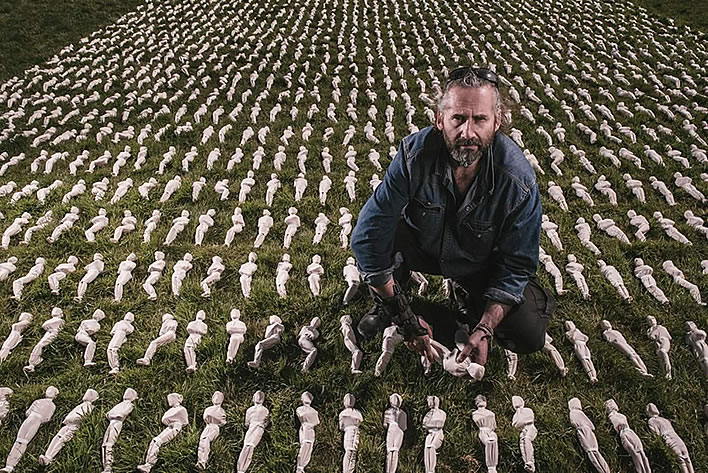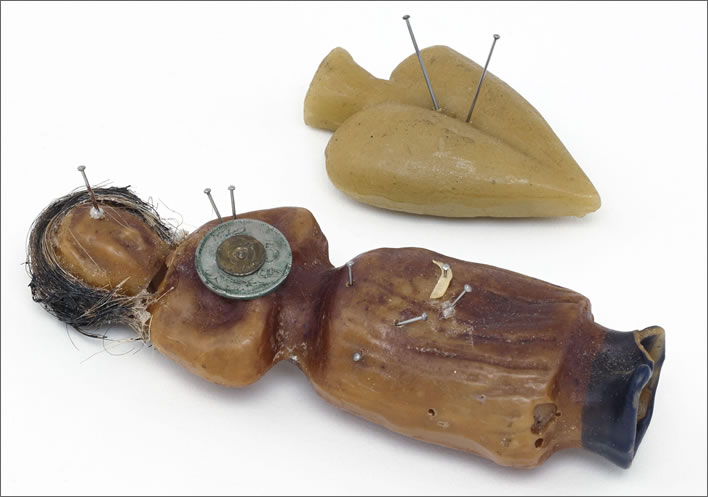Empty gestures make most noise
Richard Law, UTC 2018-11-08 15:30
Following on from our recent theme of the blasphemy of not respecting modern social pieties – in that case the Grenfell Tower tragedy – we shall blaspheme once more.
The further removed in time we become from the First World War, the wilder the commemorations appear to become. Now that we have reached the centenary of the armistice, perhaps we have reached peak poppy piety. Doubtful, somehow – all this proxy piety will have to go somewhere.
As of this moment, the prize for the current peak has to be awarded to someone called Rob Heard, who has spent four years making 72,396 twelve-inch voodoo dolls, each one wrapped in a small shroud.

The artist with his voodoo shroud dolls. He has made several previous iterations on this theme, before reaching the current magic number of 72,396. Image: Shrouds of the Somme.
The dolls are intended to represent the Commonwealth soldiers fallen on the Somme battlefields between 1916-1918 who have no known grave. The French and the Germans, who also fell there aplenty, can go and do their own commemoration, thank you – even though there are many cemeteries on the Somme containing bodies of all the combatants.
Stripping identities
Heard tells us that the names of the fallen come from the list of names cut into the panels on the sides of the Thiepval Memorial, the names of the missing. This gigantic memorial (not much smaller than the Eiffel Tower) was finished in 1932 –nota bene with only seven years to spare before the meatgrinder was started up for the second time. Strictly speaking, therefore, the missing already have a huge memorial close to where they fell.
The lists on the panels memorialise those who fell, but the whereabouts of whatever body parts of theirs that might remain are unknown. Across the many main and battlefield cemeteries of the Somme alone there are numerous graves containing body parts without a name – 'Known unto God', to quote Rudyard Kipling's fine phrase on each headstone. Unlike the French and the Germans, the British do not use mass graves and whatever is left of every human being gets its own grave.
And why choose only the missing? If you really want to shock the public by the scale of the carnage, you need to add the total for the missing to the total for the dead, which will require you to produce around 207,000 dolls. And this is only for the Somme battlefields. For all the other hellholes of the First World War you would need just under ten million dolls, plus another eight million if you wanted to represent all the civilian casualties. In this context, the 72,396 dolls merely of the missing are a very feeble gesture. Better get carving and enshrouding now, Rob, if you want it to be ready for the 200th anniversary.
There are a number of paradoxes that the grumpy sceptic has to overcome before suspending disbelief sufficiently to stop laughing.
Mumbo-jumbo
The first paradox is, of course, that Heard has taken the names without known bodies from the Thiepval monument and anonymised them – dehumanised them, in other words – into identical dolls without names. Your author considers that to be a disgraceful insult. He has in effect created a mass grave out of individual graves.
In the process of effectively anonymising them, Heard performs some voodoo mumbo-jumbo ritual which, in his head at least, has the effect of personalising the anonymous doll:
As I go through the process of putting the figure within the shroud, I cross a name off. It's vitally important that each is associated with a name, otherwise the individual gets lost in the numbers.
You surely appreciate now why we use the term voodoo. Heard cannot walk around his field of shrouded dolls, point to one of them and say 'That's the doll representing Private Duffy of the Lancashire Fusiliers'. His naming procedure is just some voodoo ritual that in his mind magically associates the doll with that name and in turn with that real person. If he really believes this, he is insane.
Leveraging piety
The second paradox is that grief is personal– by definition. You can lose a loved one; you can't lose 72,396 loved ones. Deep emotions may indeed arise at the thought of the millions of lives tossed away for a handful of dirt – and your author feels them all – but grief is not one of them. Nor is grief just some form of generic sadness. Filling a field with 72,396 of these dolls does not multiply the sadness, either.
By dehumanising the named dead, Heard has taken all grief out of their loss: one cannot grieve for a voodoo doll. Grief at Heard's field of anonymous dolls is impossible. His installation is just vacuous showmanship.
On his project website– such things are projects these days – Heard quotes himself in an ejaculation of fake social piety:
All these men are laying[sic] on the battlefield to this day and in some small way I would like to bring them home.
It takes true derangement to concentrate so much bunkum into one sentence.
'All these men' are not 'lying on the battlefield to this day'. Many of them were indeed blown to kingdom come, some were buried in battlefield cemeteries, which were in turn not infrequently blown to kingdom come by shelling when the fighting swept over them again. But large numbers of them are in the 'Known unto God' graves scattered across the Somme and are not 'lying on the battlefield'.
After the war, many of the small ad hoc cemeteries were cleared and their occupants reburied in permanent 'concentration' cemeteries. In sum, therefore, very few of the dead are nameless, only their bodies have not been identified or found.
In a continuing act of true piety, the Commonwealth War Graves Commission has worked diligently over the years in the task of recovering, identifying (where possible) and respectfully burying the remains of the fallen. It doesn't need an artist to 'bring them home'.
Whether the Australians, the Canadians, the Ulstermen etc. etc. wish to be repatriated from 'some foreign field' to a field in the Queen Elizabeth Olympic Park in London is an open question, but one not difficult to answer.
For such presumption and such flatulent and expensive gestures of social piety, money can always be found, it seems:
We would like to thank Queen Elizabeth Olympic Park for hosting the Shrouds, our partners DHL, VolkerFitzpatrick, Imagination, the Commonwealth War Graves Foundation, QEOP, UCL, Wilson James, SSAFA, West Ham United, Westfield, Waitrose, Network Rail and Transport for London without whom this would not be possible and the London Mayor’s and Lieutenancy’s Offices for their support.
Note: The Commonwealth War Graves Foundation is the recently formed (2017) money-raising and distribution wing of the Commonwealth War Graves Commission.
It is to be hoped that Commonwealth War Graves Commission supplied no more than their name. It is shocking enough that they are associated with this travesty in any way at all. We grumpy sceptics always like to follow the money, though.
All profits raised from donations will be given to SSAFA, the Armed Forces charity and the Commonwealth War Graves Commission.
We puzzle how you can make 'profits from donations', but let's leave that body unexhumed.

From our previous post, a wax doll and a wax heart with pins. The essence of superstition: the magical identity of original and model. What will happen if you stick pins into Heard's voodoo dolls? Would that be impious? Would that be blasphemy? Would Private Duffy of the Lancashire Fusiliers, in addition to all he has already gone through, feel a sharp stabbing pain? Image: Musea Brugge.
0 Comments UTC Loaded:
Input rules for comments: No HTML, no images. Comments can be nested to a depth of eight. Surround a long quotation with curly braces: {blockquote}. Well-formed URLs will be rendered as links automatically. Do not click on links unless you are confident that they are safe. You have been warned!